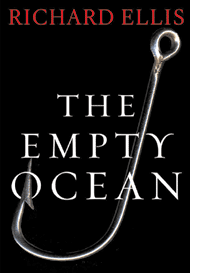
One thing that humans are very proficient at is killing. Since man started hunting in boats, we have been killing everything we could catch from the world’s oceans. We’ve killed for food, ornament, fertilizer, and fuel. We kill by accident (the term commercial fisheries use is “bycatch”), out of carelessness, and frequently for the sheer hell of it.
For most of our history, given the vastness of the oceans and the seemingly unlimited life therein, we couldn’t impact most species of fish, whales, turtles, seals, and seabirds. Now, though, as Richard Ellis bluntly argues in this important and aptly named book, we have the resources and the technological wherewithal to so reduce so many species of ocean life that the ecological consequences are incalculable.
By continuing to “harvest” sea life as if it were boundless, we have nearly finished off the fisheries of cod, sardines, and anchovies, and are fast working our way through the remaining tuna, swordfish, large sharks, Chilean sea bass, and Atlantic salmon. How is this possible? It’s as simple as demand outpacing supply. “A million vessels now fish the world’s oceans,” Ellis writes, “twice as many as there were 25 years ago.”
This is not an easy book. Ellis is fond of facts and numbers, and with them he’s fashioned a nigh-overwhelming elegy for the victims of our gill nets and drift nets, factory fishing ships, explosive harpoons, longlines, trawlers, and fish-spotting aircraft — not to mention our collective shortsightedness.
Among the obstacles to halting this enormous, long-running tragedy: Powerful economic interests skew the policies of such regulatory bodies as the U.S. National Marine Fisheries Service, while much of the overfishing takes place in international waters where no one country or organization can manage what’s left of the “resources.”
Is there any hope? Maybe not much, but consider that the depleted species themselves are resilient and, given half a chance, can and do rebound, albeit slowly. Ellis notes that marine reserves — “no-fish” zones — have proved effective and should be established on a larger scale. Still, time is short, and the oceans’ precious biodiversity is already damaged. As Pogo put it and Ellis would agree, the enemy is us.












